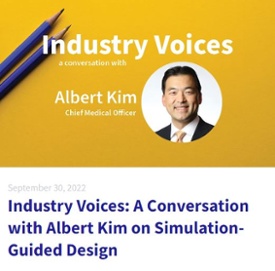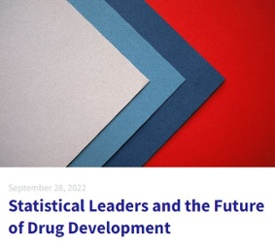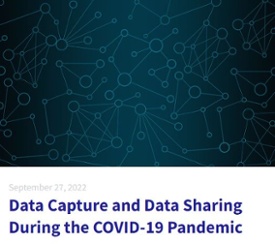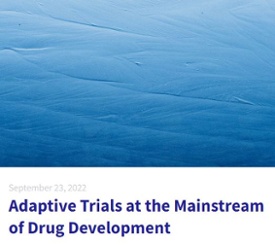Joshua Schultz on the Evolution of Cytel
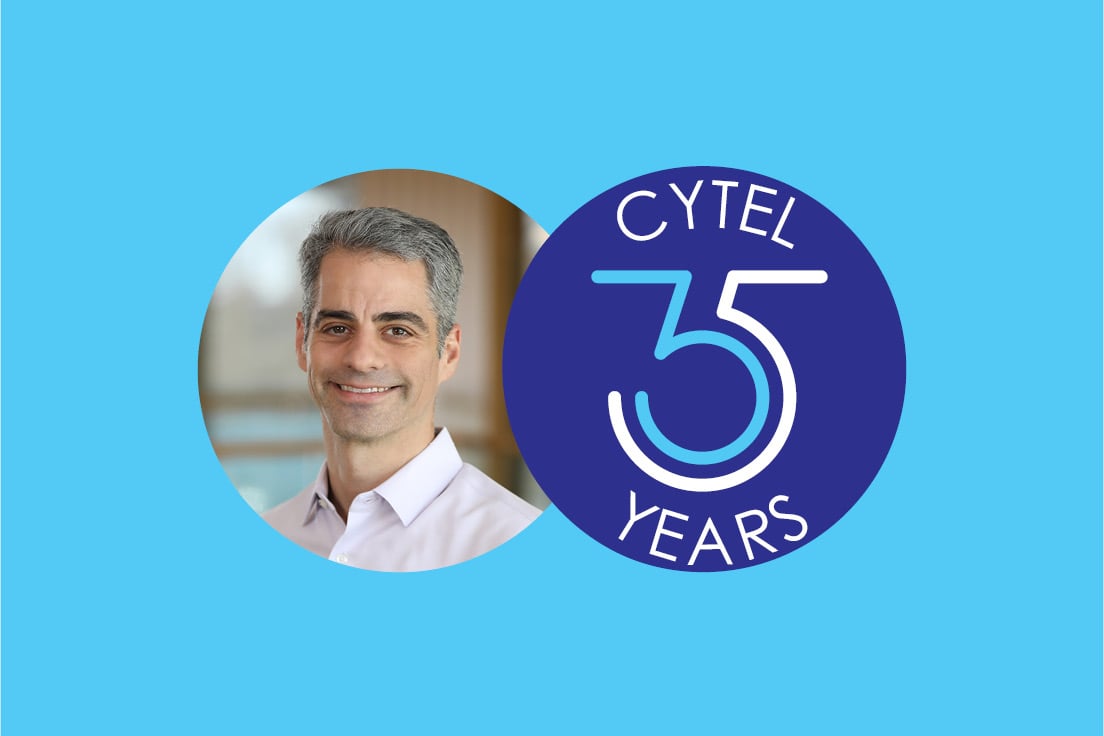

On the occasion of Cytel’s 35th anniversary, our CEO Joshua Schultz sits down with Dr. Esha Senchaudhuri to discuss the transformation of the industry and the evolution of Cytel.
Cytel is celebrating its 35th anniversary this year. How would you say the industry has transformed in that time?
Let me start with what I believe has stayed the same in the past thirty-five years: we are still bringing cutting-edge science to develop innovative treatments that help people live better lives. That is a great place to start and is a big part of why many of us chose to be in this industry.
And a lot has changed. Modern treatments tend to be far more complex than traditional treatments – think mRNA vaccines and monoclonal antibodies compared to small molecules like Lipitor. Data sources have also become far more complex. In previous eras, data was collected on paper case report forms at a doctor’s office, and those forms were a few pages long. We now have wearables, patient-reported outcomes, lengthy follow-ups, electronic medical records, and long case report forms, all of which requires integration, management, and statistical methods to extract full value.
Third, the industry is now very global. It used to be centered in U.S. and European academic medical centers and now there is so much work happening in countries like China and Korea, which were not even really a part of the conversation thirty-five years ago.
On one hand, things are very much the same. But on the other hand, they look very, very different.
What are some ways Cytel has been a part of that transformation you just talked about? What would you say are Cytel’s main contributions to the industry?
Well, the number one impact that Cytel has had is the creation, championing, and eventual widespread adoption of adaptive designs. Thirty-five years ago, they were an oddity and largely theoretical – now, our whole industry is more efficient and effective because of them. We are making better decisions, sparing patients and costs, and getting treatments to market faster because of adaptive designs. Cytel has been a pioneer and we continue to be on the cutting edge of innovation as we invest heavily in new methods and approaches.
That said, while this is our legacy and we will continue to invest heavily in adaptive methodologies, we have also expanded our focus, recognizing that there is so much more that advanced analytic methods can do for our industry. At Cytel, this includes the application of advanced analytics to the use of real-world data, both for value evidence and registrational studies as well as leveraging vast amounts of cloud compute to power sophisticated simulations to solve many formerly intractable problems.
Value evidence is a good example of an area that we traditionally didn’t support but where the power of innovative quantitative thinking can play an important role. Historically, the need for robust value evidence was relatively modest compared to getting regulatory approval. However, payers across the globe are now asking more complex questions, leveraging a range of data assets, and demanding a high level of scientific rigor before funding the next generation of expensive treatments. Cytel has invested heavily in innovating in this space through our Real World and Advanced Analytics group and now have industry-leading levels of peer-reviewed publications and papers/posters/presentations at industry forums like ISPOR.
Lastly, we are continuing to push boundaries in the way studies are designed and executed. This includes broadening our industry-leading statistical consulting expertise to include other domains so that we can better partner with our clients. It also means extending that design excellence into execution where we can ensure that innovative approaches are incorporated appropriately, which, in many cases, requires developing novel ways to manage wearables, real-world data, and bespoke clinical data.

What does it mean to be a part of the Cytel community today?
When I first got to Cytel, I made a commitment to the community that the changes in ownership structure would not change who we are at our core. I am proud to say that we have lived up to that commitment with substantial increases in our investment in scientific innovation, advanced statistical methods, novel software, and accessing incredible talent on a global basis. If you looked around the first Cytel office in Cambridge, Massachusetts, thirty-five years ago, you would see exactly the same type of intelligence, curiosity, and passion for the work that made the company special then and makes it special now.
To me, that is the heart and soul of who we are, and my expectation is that we will continue to rely upon that going forward.
How has the global nature of Cytel influenced its direction, do you think?
Well, it has not changed at all in terms of who we are and what we do. We continue to be on the cutting edge of scientific innovation, looking to hire the best and brightest individuals. We have primarily gone global to find great talent – with great effect. For example, there are thousands of fantastic statisticians and people with advanced quantitative skills in APAC more broadly that we were traditionally unable to access due to lack of footprint and focus. However, our requirements have not changed in terms of who we are looking for, what we do, and the scientific ‘DNA’ of the people.
What I think has changed quite fundamentally is the way that we work. Thirty-five years ago, we had easier and more direct access to each other, with Cyrus or Nitin literally being able to communicate with the whole company just by yelling down the hallway. But that has changed because of remote working brought on by COVID and our geographical spread. While this has made it far more challenging to have direct in-person connection, I am also quite amazed and impressed by how people find ways to connect, collaborate, and solve tough problems despite working remotely.
Cytel has always been committed to combining technological innovation and methodological innovation. How would you characterize how that relationship has evolved?
I think many people know that Cytel was originally founded as a software firm, and that is still very much at the heart of what we do today. Even though most of our employees do not directly work on new software, it really informs, guides, and, in many ways, supports all the other work that we do. We are continuing to extend and modernize our flagship East® product and have extended that to new areas such as East Bayes®. Our Solara® software showcases a whole new way of bringing compute and methods to the problems of study design.
With Cytel’s LiveSLR®, and soon-to-be-launched LiveHTA, we are helping researchers stay up-to-date with literature and analyses that are constantly changing so that they can make better decisions. I am particularly pleased that this idea came from an innovative, entrepreneurial, and passionate Cytel staff person who helped us take it from concept to a fully functional and rapidly growing product. Internally, projects like Cytemation, our automation initiative, has saved us tens of thousands of hours of people’s effort, in what would otherwise be relatively tedious activities, and allowed them to instead focus on high value-add work. When you think about all these different ways in which we have been bringing technology to bear, the relationship from the very early days to now is clear.
In 1982, Professor Marvin Zelen, a pre-eminent statistician who mentored dozens of Cytel scientists and became a Cytel board member, predicted that statistics and computing would become closely aligned, particularly in the biomedical space – a view that received some vigorous criticism at the time. He was also the one to predict that the industry would shift from traditional biostatistics to a more robust data science. Has Cytel proven Marvin right?
I think time has definitively proven Marvin right, and Cytel has both greatly benefited from and been a part of driving that shift. The idea that you could do biostatistics without robust computation and what we now call data science is not something anyone would question anymore. If you think about some of the areas where we have been on the cutting edge such as simulation and real-world data, they would have been right at the heart of Dr. Zelen’s argument.
Where do you see Cytel at its 45th anniversary celebration? In the spirit of innovation and forecasting, do you have any predictions about what the industry will look like then?
It is dangerous to follow Dr. Zelen with my own predictions! I am sure his are far more accurate than mine. But I absolutely do have a perspective on what the industry will look like and the role we will play. Firstly, I believe it will be in many ways unrecognizable and much better. We are at the forefront of some profound changes that I believe will greatly impact the way that trials get designed and executed, with a commensurate improvement in efficiency and effectiveness that our industry desperately needs. For example, I believe that study design will go from being a lot of art and some science to being some art and a lot of science, with the help of real-world data, simulation, tools like Solara, and better integration across disciplines.
This will impact the kind of studies that get designed with a shift toward reliance on innovative data sources. This will, in turn, reduce the focus on data collection (where the majority of study budgets traditionally sat) to data sourcing, integration, and analysis.
Finally, I think there are a whole bunch of relatively smaller elements that, in aggregate, will add up to a fundamental change. For example, we will keep coming up with new statistical methods. The flexible working model that was thrust upon us with COVID will remain that way. Compute will continue to become ever more ubiquitous. If you fast forward ten years and look at what Cytel is doing, it will look dramatically different because of all of these factors. But one thing that will not change is our focus on solving tough problems, leveraging quantitative tools by the brightest folks in the industry.

Would you be willing to speak about how Cytel has responded to the COVID-19 pandemic?
I’ve had the privilege of multiple moments in my career that I look back on with fondness, but I have to say that I am most proud of Cytel’s response to COVID-19. I mean that in two very different ways.
One of them is internal. The downright heroism that was displayed by all of our 1,700 employees in March 2020 who had to start working remotely over the span of a weekend was incredible. The disruption to many people’s lives was intense and was made worse by the general environment of intense anxiety and uncertainty generated by COVID in those early days. It was amazing to witness the whole organization step up and find new ways of working together that allowed us to not just execute, but to continue growing at a great pace, drive innovation, and push boundaries. To me, that is an unbelievable outcome and one I absolutely would not have expected.
The other area of great pride for me personally was how Cytel helped support the response to COVID externally. As we go about our day-to-day work, it is easy to forget how we are positively impacting people’s lives every day. Our industry’s response to COVID was a reminder of how big an impact we have in supporting a healthy global community. More specific to Cytel were the dozens of COVID studies we supported directly, the COVID studies that we designed (including the TOGETHER Trial, which was awarded Trial of the Year) and the many non-COVID studies that needed rescuing due to recruitment and data collection delays.
COVID, and our response to it, truly demonstrated what Cytel looks like at our very, very best.
Any messages you want to send to the Cytel community on this occasion?
It has been an honor and privilege to work with this team on the cutting edge of science to make a real difference. I look forward to the future with excitement as we build upon a great foundation to make even bigger contributions to human health.
Read the full 35th anniversary interview series here:



